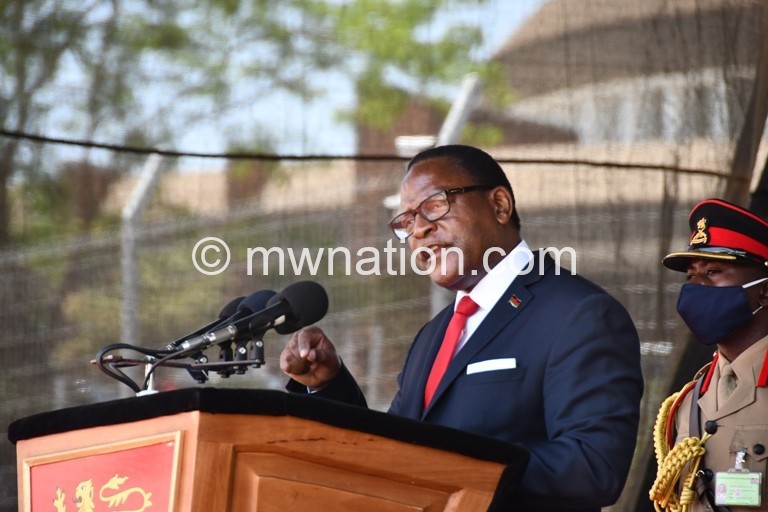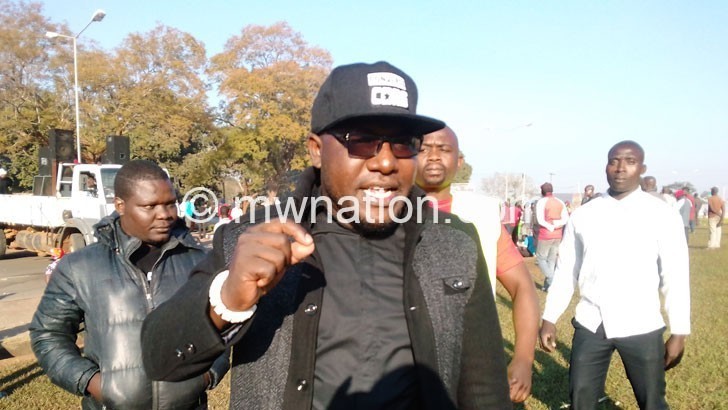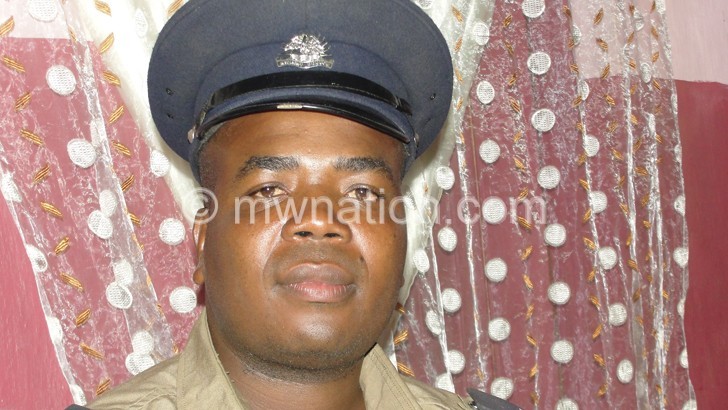Chakwera takes the gloves off
Facing a nation pregnant with expectation on accountability for K6.2 billion Covid-19 response funds, President Lazarus Chakwera last night fired technical leadership of the fight, suspended cluster heads and ordered immediate review of government systems.
The President, delivering his sixth televised National Address on the War on Covid-19 from Kamuzu Palace in Lilongwe, fired Presidential Task Force on Covid-19 co-chairperson Dr John Phuka and replaced him with Dr Wilfred Chalamira Nkhoma. He also removed Department of Disaster Management Affairs (Dodma) commissioner James Chiusiwa with immediate effect.
He said both Dodma and the Covid-19 Task Force require strong leadership, observing that the red flags regarding spending as raised by the Office of the Ombudman in its November 20202 report were missed and left unchecked by the technical leads of Dodma and the Covid-19 Task Force, who report directly to his office.

The President said: “The reports submitted by clusters and
the scrutiny that has followed has come to the technical leadership of the Covid-19 Task Force and the technical leadership of Dodma months after the spending was already done, which shows a lack of toughness by those leaders in demanding accountability in the course of spending.”
Chakwera was also not amused with the Covid-19 response clusters for submitting “a substandard report that has no backing documents” and for defying a presidential directive to submit reports on a weekly basis”. Thus, he directed the Secretary to the President and Cabinet to immediately suspend all cluster heads, mostly controlling officers in ministries, departments and agencies.
He said the suspensions will also pave the way for a forensic audit the National Audit Office has already embarked on and an independent investigation the Director of Public Prosecutions has requested the Malawi Police Service to conduct as a matter of urgency.
The Nation established that there are 15 clusters under the National Covid-19 Response Programme . From the summary we have seen, the security and enforcement cluster under Malawi Police Service was the sole star performer whereas the rest, notably security and enforcement under Malawi
Prisons, Immigration and Malawi Defence Force were found wanting.
The other clusters whose reports were rejected were coordination, maintenance, food security, local governance coordination, shelter and camp management, health, health (mask production), education, public communication, protection cluster and Wash.
The President also said that 12 clusters are yet to submit a weekly report on their allocation of K17.52 billion three weeks after his directive.
In a bid to clean up the system as a whole, Chakwera said there is need for a comprehensive review and overhaul of the three
government systems of allowances, procurement and employment contracts as a matter of urgency; hence, he tasked Vice- President Saulos Chilima, in his capacity as Minister of Public Sector Reforms, alongside a special task force the two will set up, to prioritise a review of these three government systems and submit recommendations for their overhaul within three months. and overhaul of the three
H e s a i d : “ T h e recommendations must include any legislative changes we must make in our laws at one of the sittings of Parliament this year so that our laws protect the interests and resources of the public, not the rubble of public servants who use broken systems to loot and use bad laws and contracts to keep their jobs in the system and keep looting.
“The recommendations must also include a restructuring of the civil service to be more efficient and of civil servants’ conditions of service so that the good people in the system are well supported and not able to use poor pay as an excuse for wasting, abusing, and stealing public resources.”
But while largely welcoming the steps announced by the President, a governance analyst mentioned the absence of any Cabinet casualties as a sign that the President did not go far enough to stem the lack of accountability of the abuse.
Q u e s t i o n s a l s o lingered over whether the suspension of the heads of the clusters also included their substantive civil service positions or just their positions in the response plan.
In an i n t e r v i e w, governance analyst Henry Chingaipe said the moves
made by the President were in right direction, but said the decisions should have been made much earlier.
But he said the President should have put a timeline for the audit report and replacing of Dodma commissioner.
“I didn’t expect Dr Phuka to go so it surprised me somewhat, but I guess as chair, he should have made sure that the task force had a mechanism of monitoring and doing ground-truthing on PPE procurements. The reports seen so far suggests that no such system existed or if it did, it was dysfunctional and he should have worked on it,” said Chingaipe, noting that Presidential Task Force on Covid-19 co-chairperson Khumbize Chiponda, who is also Minister of Health, might have been spared for stability.
The President commended Phuka, whom he maintained from the task force engaged by his predecessor Peter Mutharika, for his contribution.
In a separate interview, Human Rights Defenders Coalition (HRDC) chairperson Gift Trapence yesterday welcomed the moves by the President, particularly the forensic audits.
But Trapence said firing Cabinet ministers, whose departments have failed to account for funds, could also have sent a strong signal of commitment to uproot corruption.
Institute for Policy Interaction (IPI) executive director, Rafiq Hajat said the revelations so far were just a tip of the iceberg, saying: “The rot is very deep… The entire system needs radical reform.”
Phuka was replaced with Chalamira Nkhoma, who has previously served as National Tuberculosis Control Programme manager, director for preventive health services and director of the National Aids Commission as well as acting country representative for the World Health Organisation (WHO) in Lesotho and WHO senior public health adviser





